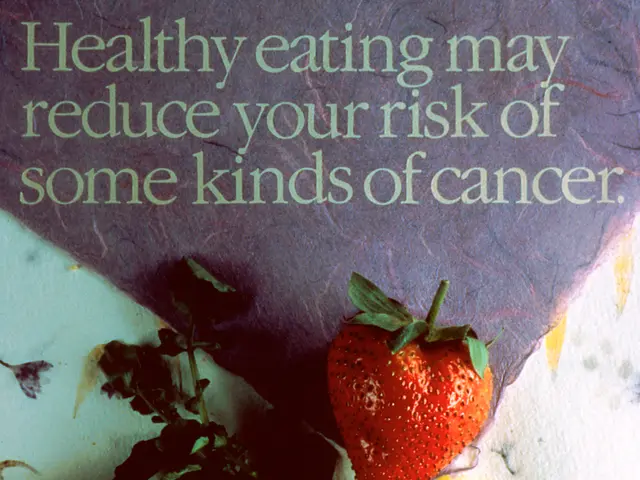Dieting with reduced calorie intake potentially linked to heightened risk of depression
Modern Weight Loss Trends and Their Potential Impact on Mental Health
A novel study, spearheaded by Canadian researchers, investigate the relationship between dieting and depression symptoms, offering new insight into a pressing public health matter.
In today's society, an overwhelming majority of U.S. adults grapple with obesity or being overweight, often resorting to various techniques to achieve weight loss. This could involve modifying dietary habits, employing medications, or other means.
However, a common pitfall for those pursuing weight loss is excessively restricting calorie intake or specific nutrient types - a practice that could potentially carry both physical and mental health risks.
According to health recommendations, decreasing daily calorie consumption by 500 to 1,000 calories can lead to a weight loss of 1 to 2 pounds weekly. Swapping sweetened beverages for healthier alternatives and making simple swaps in meals can contribute significantly to reaching this goal. But, many people adopt radical measures, including extreme calorie counting or following a single food group-focused diet like the carnivore diet.
It's crucial to consider the long-term consequences of these methods when striving for a healthier lifestyle. Excessive dieting can trigger various health problems, and recent research suggests it might also influence mental health, a topic the present study delved into.
The study's findings were published in the prestigious BMJ Nutrition Prevention & Health.
Exploring the Link Between Diet and Mental Health
Depression has become a widespread mental health issue, affecting countless individuals every year in the United States. According to data from 2020, around 18.4% of American adults reported being diagnosed with depression at some point [9].
Studies indicate that a balanced diet packed with nutritious meals can play a role in maintaining mental health, while processed foods may negatively impact it. Researchers were intrigued by the impact of calorie and nutrient restriction, a gap they sought to fill with this study.
Using data from 28,525 adult participants, the researchers categorized them into four groups: calorie-restricted dieters (8%), nutrient-restricted dieters (3%), those following established medical dietary patterns (like the DASH diet, 2%), and those not dieting (87%) [2].
The researchers analyzed the participants' responses to the Patient Health Questionnaire-9 (PHQ-9), a tool used to assess depressive symptoms, making adjustments for factors such as body mass index (BMI) and biological sex [2].
Stronger Mental Health Risks for Calorie Restrictors
The study results showed that participants who limited their calorie intake faced a higher likelihood of experiencing depressive symptoms. Specifically, people in the calorie-restriction group registered higher PHQ-9 scores compared to the other groups, by an average of 0.29 points [2].
This association became more prominent when considering higher BMI individuals within the calorie-restriction group, who had an average PHQ-9 score increase of 0.46 points.
Overweight people who adhered to a nutrient-restricted diet didn't show a higher PHQ-9 score on average. However, when focusing on overweight individuals within this group, they exhibited a higher PHQ-9 score of 0.61 points.
Certain associations emerged when considering biological sex. The researchers discovered that, in men, various diet patterns were associated with heightened somatic symptom scores, which pertain to physical symptoms related to psychiatric distress [2].
Possible Causes for Calorie Restriction’s Impact on Mental Health
According to Amy Roethler, a dietitian and nutritionist for Newport Healthcare's PrairieCare program in Minnesota, people on low-calorie diets often tend to overlook their nutrient intake, focusing instead on calorie count [9].
Roethler highlighted that adjusting dietary habits towards eating more fruits, vegetables, whole grains, healthy fats, and lean proteins helps individuals experience improved mental health, nurturing sustained changes.
Roethler also emphasizes the importance of referring patients trying to lose weight who have a history of depression to registered dietitians for guidance [9].
Researchers' and Experts' Perspectives on the Association Between Calorie Restriction and Depression
Timothy Frie, a neuronutritionist and nutritional psychology researcher, offers his viewpoint on the study, stating that calorie restriction is associated with a rise in depressive symptoms, particularly among men and overweight individuals with elevated BMI. Frie explains that such diets may cause nutrient deficiencies that can exacerbate depressive symptoms [9].
Cutting calories or eliminating food groups can lead to insufficient intake of vital nutrients essential for mood regulation, such as B vitamins (especially B12, B6, and folate), iron, and omega-3 fatty acids.
As a result, the study authors are interested in investigating the specific nutritional deficits associated with dieting and their effect on depressive symptoms [9].
Enrichment Data:
- The research suggests that excessive calorie restriction increases the risk of developing depressive symptoms, especially among men and overweight individuals.
- Inadequate nutrient intake as a result of calorie restriction may contribute to heightened depressive symptoms, as certain essential nutrients are vital for mood regulation.
- Balanced diets can have a positive impact on mental health, while diets that are overly restrictive or focus heavily on a single food group could negatively impact mental health.
- The study, focusing on the relationship between dieting and depression symptoms, adds to the growing body of evidence about the importance of examining mental health in the context of weight loss trends.
- The study found that participants who restricted their calorie intake were more likely to experience depressive symptoms, with an average PHQ-9 score increase of 0.29 points compared to other groups.
- The association between calorie restriction and depression seemed more prominent among overweight individuals, as those within the calorie-restriction group with a higher BMI had an average PHQ-9 score increase of 0.46 points.
- On the contrary, individuals following established medical dietary patterns like the DASH diet did not exhibit increased PHQ-9 scores on average, indicating that balanced diets may not have the same impact on mental health.
- Nutrition experts, such as Amy Roethler, suggest that focusing too much on calorie count while neglecting nutrient intake can worsen mental health outcomes, emphasizing the need for a balanced diet enriched with fruits, vegetables, whole grains, healthy fats, and lean proteins.







